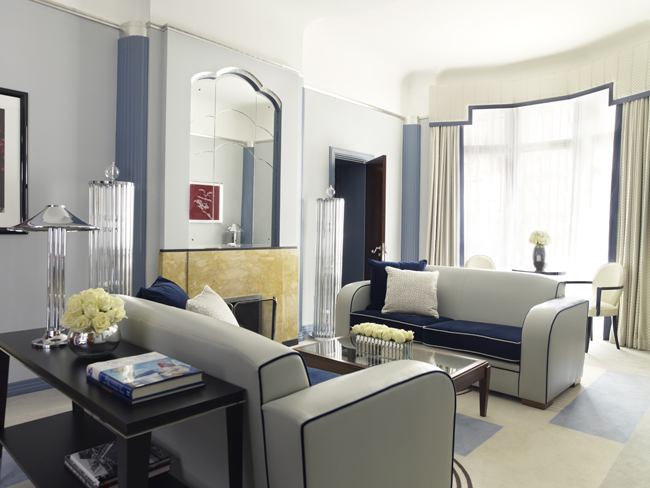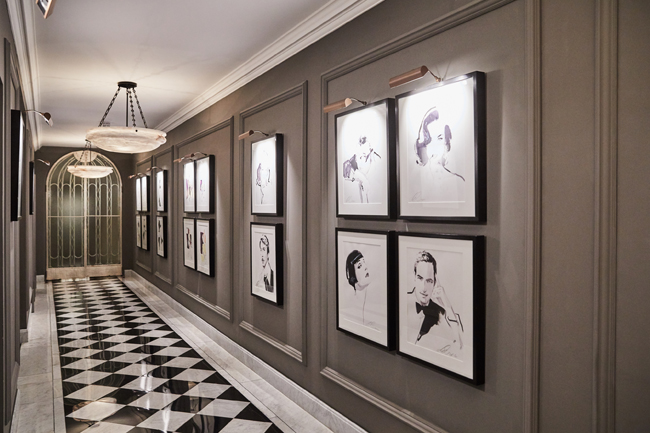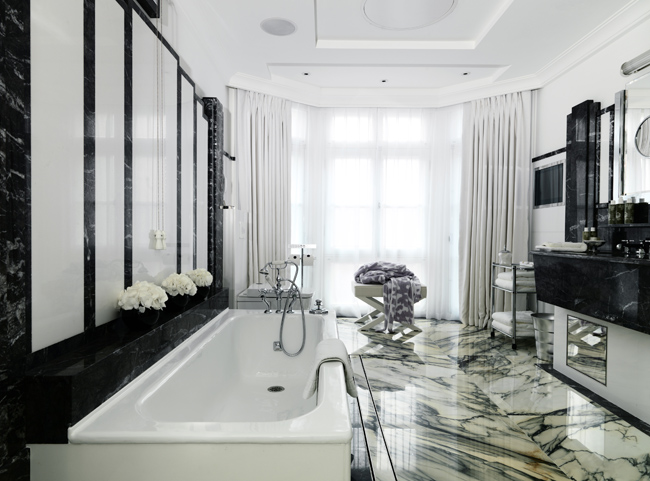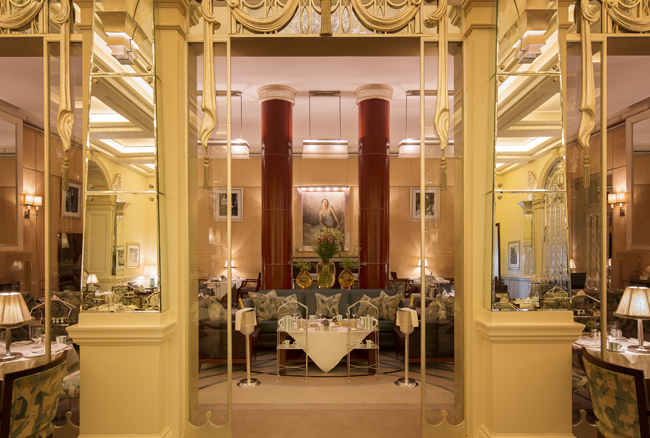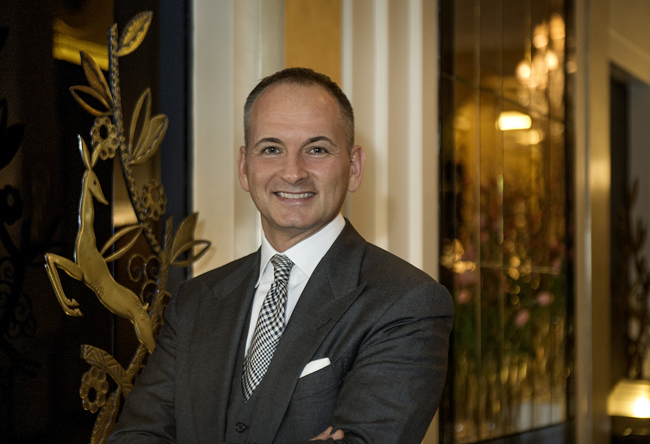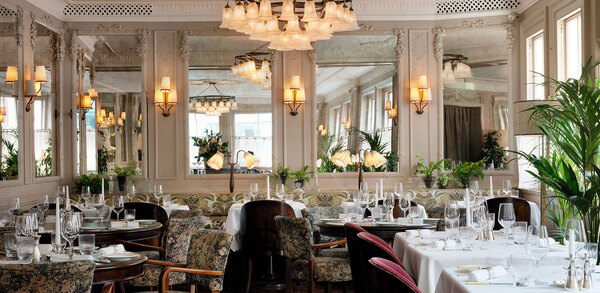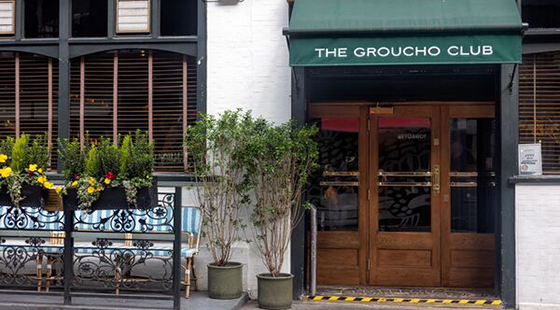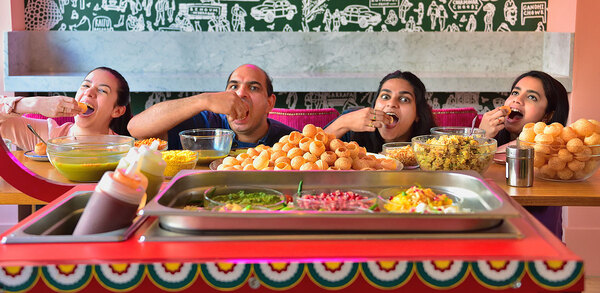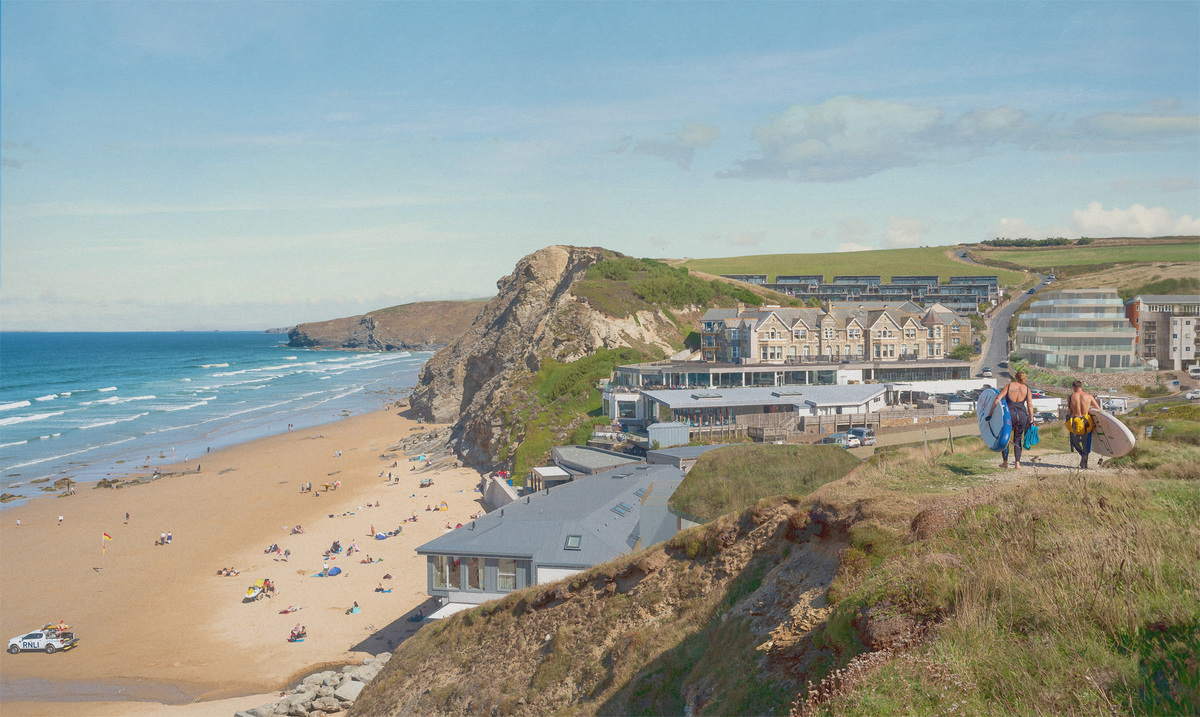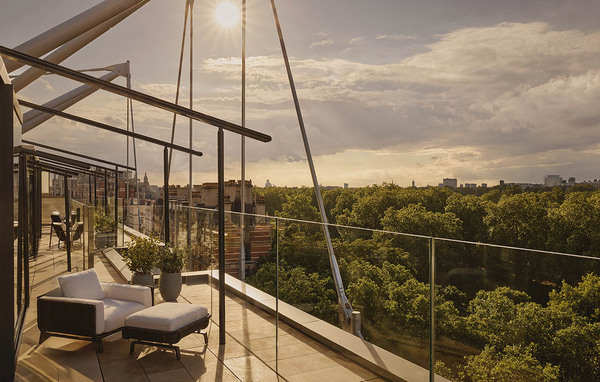The Caterer Interview: Paul Jackson, general manager, Claridge's
Paul Jackson returned to Claridge's as general manager two and a half years ago, 26 years after he had last worked at the property. Janet Harmer finds out how he is moving the grande dame of UK hotels forward while continuing to respect its heritage
How did you first get into the hospitality industry?
I started my career with the Savoy Hotel Group. While I was studying at Norwich Hotel School, I did six months as a commis waiter in the restaurant at the Connaught hotel when Michel Bourdin was the chef and Paulo Zago was the general manager. After studying I was very lucky to go to work at the Connaught's sister property, the Hotel Lancaster in Paris. I worked in cost control and then on reception, where I managed to get my French up to speed. At the time, both hotels were part of the Savoy Group.
And then you moved to Claridge's?
Yes, I was invited by the general manager Ron Jones to join the hotel as night manager, which I did for three months before moving into food and beverage.
Why did you move on from Claridge's?
It was interesting as a review into the financial management of the Royal Household had just taken place. Funding was strict, which is something Iâd experienced with the Savoy Group, but not in such a disciplined way. We worked a lot on provenance and British ingredients â" a lot of items came from France. So we moved towards serving British cheese and worked with the National Fruit Collection at Brogdale in Kent. I learned a lot about etiquette and a very high calibre of management, which helped me in my next role at the Ritz London.
Then you went abroad for 17 years. What encouraged you to leave the UK?
I had an opportunity join a family business in New South Wales, Australia, to work on a rose farm. We grew field roses, which have great longevity and an amazing aroma and explains my passion for scent. I then went on to work for some restaurateurs in Melbourne before returning to hotels in Asia. I went from managing two little restaurants to running a $50m (£37.8m) F&B turnover business for IHG at the Grand InterContinental in Seoul.
You then went on to work for Mandarin Oriental for 10 years. How did that experience help your development as a hotelier?
I worked for Mandarin Oriental in Hong Kong, Bangkok and finally China. The basis of working overseas and in the UK is the same, however, as well as giving me experience of working with different cultures, it also taught me about different company structures. For instance, Mandarin Oriental in Hong Kong is 100% owned by Mandarin, whereas the Bangkok hotel is a management contract, so you need to understand different business models, relationships and financial commitments that stem from that.
When you are not speaking the same language, you need to understand what people are telling you as in some cultures they believe it to be impolite to disagree with you. You have to read between the lines. I remember thinking how important it was that I should be focused on listening and asking the right questions.
Chinese relations in particular were interesting. When I met the owner, it was critical that there was a trust and an understanding of philosophy and styles. Agreements were done outside of the formal meetings: the meeting were often held to rubber stamp earlier agreements. Understanding that lateral relationships are as important as managing the operations has helped me going forward.
What was it like to arrive back at Claridgeâs two and a half years ago, this time as general manager?
The nice thing was that there was so many staff members who were still here from when I left 26 years earlier: Martyn Nail, our executive chef; Martin Ballard, executive head concierge, who is often known as Lord of the Lobby and has been here for more than 30 years; and Roman Probodziak, the senior doorman who has unbelievably done 42 years loyal service at Claridgeâs. There were about 30 people who I knew.
What was really pleasant was that although the hotel has changed, the same DNA of the property I knew all those years ago was still here and it still had the feel of a family business. I think in many respects the philosophy of the company today is very similar to the Savoy Groupâs philosophies and that is very comforting. It certainly aligns with my own thoughts.
There is a lot of security in working within big corporations, but they lack the individuality and entrepreneurial skills I have always embraced. Those things become diluted because of policies and procedures. It has been really refreshing to come back to an environment which is focused on inn-keeping and understanding service from a guest perspective. Kurt Wachtveitl, who was the general manager of the Mandarin Oriental in Bangkok for 41 years, was a great master of this.
When I left, the foyer had liveried footmen and there was a string quartet. People were nervous to come into the hotel; it was a bit intimidating. Iâve enjoyed seeing how Claridgeâs has evolved, it has remained current, but is far more inclusive today, while retaining understated glamour and an amazing clientele.
How do you ensure Claridgeâs consistently remains one of Londonâs most highly regarded hotels â" reflected in being voted as the Best City Hotel in The Catererâs Hotelierâs Hotels Top 100 list in 2017?
One of the impacts of working overseas is that you donât tend to just benchmark locally, you benchmark globally. Although Iâm very aware of our competitors in London, Iâm also aware of the amazing hotels in Paris, Hong Kong, Shanghai. It is important to understand that the guests who choose to stay in Claridgeâs can chose to stay anywhere in London or anywhere around the world. There is not just one thing that makes Claridgeâs consistent, but a key element is the continuity of its people which provides a great feeling of being welcomed back as an old friend.
That is why it is critical that the concierge and doorman, who I have already mentioned, play such an important role.
General managers come and go â" Iâm Pat Mooreâs (PA in the GMâs office) ninth general manager. She has stronger relationships with guests than I do. But as well as welcoming back past clients, we also want to embrace new clients â" and that is one of our successes. You see other hotels with great history, but they havenât stayed current. At Claridgeâs we donât stand still.
What are the key challenges that you are currently facing to ensure Claridgeâs maintains its exceptional high standards?
Regardless of the industry, every senior executive would say acquisition, retention and development of people. I have worked in many environments and labour is always a challenge.
Brexit is something I canât control, so I donât really worry about it. Worrying about it doesnât make it any better. When it comes to recruiting, we are very fortunate in that the brand is very strong. If we what to engage and work with somebody, people are genuinely very enthusiastic. What I can do is make sure that the welcome here is amazing, that there is no bureaucracy, that it is a very natural environment, the quality of what we are doing is great, and that there is innovation to offer staff. For me, it is about focusing on the world I can control rather than the things I canât. Once Brexit takes it natural course, there will be other challenges. So Iâm a little bit more pragmatic and very fortunate that London is one of the top performing hotel markets in the world.
A major challenge is that Claridgeâs is an old property; it was built in 1898 with an art deco wing added in 1931. Air conditioning was added in the 1960s on the roof and the plumbing is old. Older buildings need a lot of love, care and attention. If we want to remain competitive and continue to be regarded as one of the best hotels in the world, you have to change and invest and that is what we are doing now.
What is the focus of Claridgeâs investment?
We are always doing something and we have just opened a terrace to Claridgeâs Bar, on the corner of Brook Street and Davies Street. It adds about 20 covers within a private outside space.
Meanwhile, work is under way on a very exciting basement development under the art deco part of the building. All of the foundations were finished by the end of last year and by the end of this year we will have five completed basement shells. The existing staff dining room and changing rooms will be moved to free up space for retail concepts, a beautiful wine cellar and several restaurant concepts. We have some ideas regarding the restaurants, but their exact focus are still under discussion. There will also be two pools â" a lap pool and a recreational one, alongside treatment rooms and a gym.
We will also be adding 40 suites, which will be located on two additional floors at the top of the building. This will take our current room inventory from 197 up to 237. The designer of the suites is still being decided â" individuality has always existed in Claridgeâs interiors and that will continue. It is going to be several years before all the work is completed. The crazy thing is that we are carrying out the work while running a fully operational hotel. Guests would never know â" it is business as usual.
There have been some changes in the past year with the departure of Simon Rogan from the hotelâs one-Michelin-starred restaurant Fera. What impact has this had?
It has made little difference. We are fortunate in that we have retained continuity with the majority of the team staying. We were pleasantly surprised that we retained the star. Matt Starling, who was head chef under Simon, is still here and Fera is still successful. However, food and beverage is a little softer in London this year than weâve seen in previous years.
Our accommodation performance is very strong, weâre still seeing growth and our market share has increased. But the geopolitical situation and less consumer confidence are impacting restaurants and weâve been affected by that.
Like all London hotels we achieve an occupancy rate in excess of 80%.Our prime market is North America which accounts for 44% of our business, with 33% of guests coming from the UK and Europe. Then there is a smaller reliance on Middle East and rest of world. Iâve worked in various locations and it is very nice to be in a city which achieves a consistently strong performance.
When I arrived at Claridgeâs nearly 30 years ago, we had a definite high season when events like Ascot, Wimbledon and the Farnborough Air Show took place. Now we have far fewer troughs with the Frieze Art Fair in October, two London Fashion Weeks, film premieres and junkets filling the gaps. Afternoon tea has also brought in a great deal more business, as have the bars.
Claridgeâs is still a hotel people want to stay in and visit. It is a very special place where you can see life unfurling in front of you. We are very privileged that we have this as our office.
CV
2016-present General manager, Claridgeâs, London
2010-2016 General manager, Mandarin Oriental, Sanya, China
2008-2010 Resident manager, Mandarin Oriental, Bangkok, Thailand
2006-2008 Executive assistant manager of F&B, Mandarin Oriental, Hong Kong
2004-2005 Director of restaurants, executive assistant manager of F&B, Grand InterContinental, Seoul, South Korea
1989-2004 Rose farmer and restaurateur, Melbourne, Australia
1996-1998 Executive assistant manager, the Ritz London
1992-1996 Assistant to the master of the household (F branch), Buckingham Palace
1990-1992 Night manager, assistant F&B manager, assistant banqueting manager, Claridgeâs
1986-1990 Accounts controller, receptionist, assistant reception manager, Hotel Lancaster, Paris
Claridge's
Brook Street, London W1K 4HR 020 7629 8860 www.claridges.co.uk
Owner Constellation Hotels, owned by Qatar Holdings
Operator Maybourne Hotel Group
General manager Paul Jackson
Executive chef Martyn Nail
Bedrooms 197
Staff 600 (including casuals, made up of 45 nationalities)
Annual number of events 2,000 (from an intimate dinner for four to a wedding for 500)
Annual number of F&B covers 370,000 (including 54,000 afternoon teas)
Starting room rate £570
Claridgeâs â" a hotel for the 21st century
Having originally opened in 1856 and moved into its current home in Mayfair in 1898, Claridgeâs is proud of its history and draws on its heritage to evolve â" not to look back â" to ensure the business remains relevant for today.
The hotelâs archives, for instance, are used to inspire new designs throughout the hotel, as in the case of a recent revamp of the uniform worn by the doormen.
Meanwhile, a whole host of innovative initiatives help to make Claridgeâs attractive to a new, younger clientele. These include:
The launch of the hotelâs Christmas tree, created by a different designer each year, has become a highlight of the festive season. Past designers have included Karl Lagerfield, Sir Jony Ive of Apple, Christopher Bailey of Burberry and Alber Elbaz of Lanvin
Pop-up restaurants and bars from the worldâs leading operators including René Redzepiâs Noma in Copenhagen during the London 2012 Olympics and the Dead Rabbit bar in New York (winner of the Worldâs 50 Best Bars in 2017)
Collaboration with Sharky & George, the childrenâs party organisers who arrange imaginative ways to entertain young ones
Creation of a gallery of contemporary portraits of distinguished guests by artist-in-residence David Downton, providing a snapshot of today for the archives of tomorrow
Creative approach to social media, resulting in 171,000 Instagram followers for Claridgeâs, the highest of any UK hotel.
Hoteliersâ Hotels Top 100
Claridgeâs was named Best City Hotel at the 2017 Hoteliersâ Hotels Top 100 awards as one of six category winners. The winners of the 2018 awards, presented by The Caterer in association with Sky, will be announced on 19 July at a presentation event at the Hotel Café Royal, London.



